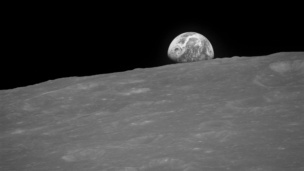Lockheed Martin has partnered with the Filecoin Foundation, a decentralized database developer, to deploy the Interplanetary File System (IPFS) for future use in lunar communications.
IPFS: The two companies are working to enable faster internet connection from the Moon. Usually when you try to access a piece of information on the internet, your computer has to fetch that data from a centralized server. IPFS uses a distributed network, so it can instead retrieve the data from wherever it was recently accessed.
The value for a lunar colony
“That means if someone else nearby on the Moon has already retrieved that data, the data only has to travel a short distance and can get to you quickly instead of traveling back and forth from Earth with every click,” Marta Belcher, president of the Filecoin Foundation, said in a company blog post.
With Artemis and humanity’s return to the Moon getting closer, more and more companies are tossing their hat in the future lunar economy ring. A long-term presence on the lunar surface will require new logistics systems. A robust communications infrastructure that doesn’t require data to make the ~240,000-mile trip between the Earth and Moon could be a key component technology.
The partnership: Lockheed and the Filecoin Foundation plan to initially deploy IPFS in LEO to test how it works in orbit. Between now and August, the two companies will find a satellite platform to host the IPFS payload, determine compatibility requirements for the bus they select, and seek out an initial demo mission opportunity.





